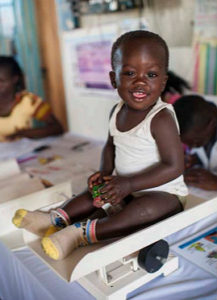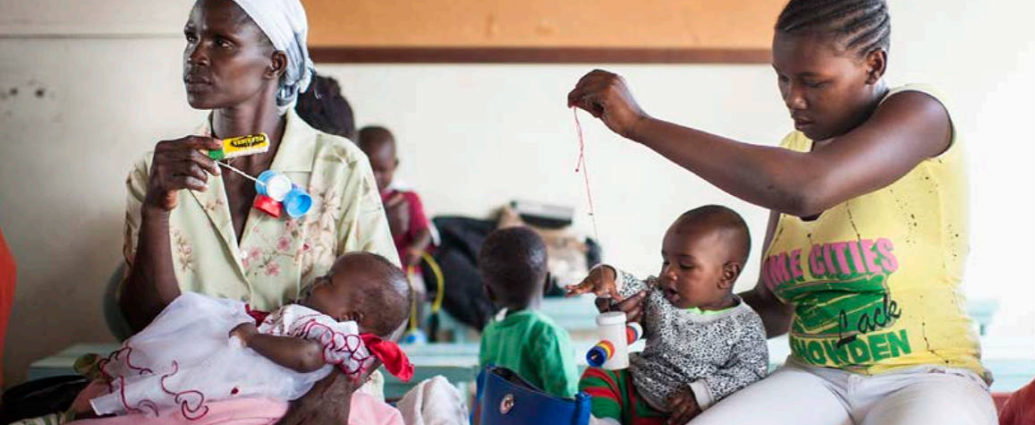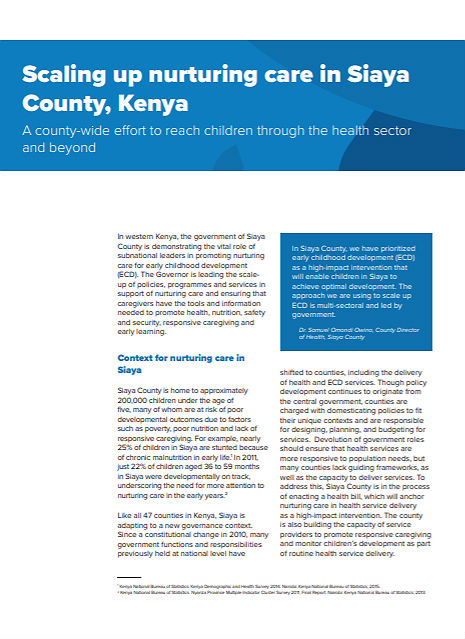In western Kenya, the government of Siaya County is demonstrating the vital role of subnational leaders in promoting nurturing care for early childhood development (ECD). The Governor is leading the scale-up of policies, programmes and services in support of nurturing care and ensuring that caregivers have the tools and information needed to promote health, nutrition, safety and security, responsive caregiving and early learning.
Context for nurturing care in Siaya
Siaya County is home to approximately 200,000 children under the age of five, many of whom are at risk of poor developmental outcomes due to factors such as poverty, poor nutrition and lack of responsive caregiving. For example, nearly 25% of children in Siaya are stunted because of chronic malnutrition in early life1. In 2011, just 22% of children aged 36 to 59 months in Siaya were developmentally on track, underscoring the need for more attention to nurturing care in the early years2.
| In Siaya County, we have prioritized early childhood development (ECD) as a high-impact intervention that will enable children in Siaya to achieve optimal development. The approach we are using to scale up ECD is multi-sectoral and led by government. Dr. Samuel Omondi Owino, County Director of Health, Siaya County. |
|---|
Actions to scale up nurturing care
Integrating nurturing care into health service delivery
The government of Siaya began to integrate nurturing care into the county’s health system in 2014 in order to improve development outcomes for children. In health facilities, priority services included clinical monitoring of developmental milestones, referral of children with suspected developmental delays, counselling on responsive caregiving and early learning and structured play sessions. The government also sought to use community health volunteer networks to provide nurturing care-related counselling and to offer additional support through home visits.
Siaya’s County Health Management Team partnered with PATH to adapt the World Health Organization and UNICEF’s Care for Child Development (CCD) package and train a cadre of government staff. CCD master trainers continue to build the capacity of facility-based service providers and community health volunteers to integrate nurturing care into routine service delivery. In an effort to move away from standalone training, the County Health Management Team works with nongovernmental health partners—including nutrition, maternal and child health, community health, HIV, and reproductive health— to include nurturing care content in their training and capacity-building activities. This “top-up” approach is cost effective and reinforces the inclusion of nurturing care as an essential component of the health system. It has also quickly expanded the health workforce trained in nurturing care: to date, about 25% of the county’s community health volunteers and 40% of health care workers have been trained to deliver nurturing care services.
| “At the Ministry of Health, we know that platforms for the delivery of nurturing care already exist within health facilities. This is why we believe that health system integration is so critical. Not only does integration help us reach young children as early as possible, it is cost effective, it enhances quality, it reduces missed opportunities, and it will enable us to scale up nurturing care services faster.” Dr. Elizabeth Omondi, RMNCAH Coordinator & ECD focal person, Siaya County |
|---|
Reflecting government commitment to a systems-based approach for quality improvement, efforts are underway to institutionalize supportive supervision for nurturing care. Four staff have been hired by the Ministry of Health (MoH) to coordinate ECD services and provide mentorship for service providers as they master new counselling skills. They identify training needs, collect data and monitor the level of integration and the quality of service provision. They also directly observe the counselling skills of trained service providers and offer coaching on areas of weakness.
Placing nurturing care on the political agenda
To close gaps in the legal framework left by devolution, MoH champions sought to elevate nurturing care on the county’s political agenda and renewed commitments to enacting supportive policies and guidelines. For example, the Government and development partners convened to revive the county health bill, which had stalled, after being drafted in 2015, because of elections and turnover of government officials. To support these efforts, newly elected County Assembly members of the Health and Public Governance Committees were made aware of the importance of nurturing care and the crucial role of the health sector in delivering ECD services.
Governor of Siaya County, Cornel Rasanga Amoth, endorsed the need for new nurturing care policies, and undertook to lead the work from his office. He created an interministerial coordination committee focused on increasing coverage and quality of nurturing care services. The committee convenes all sectors and stakeholders involved in child development – including health, finance, social protection, education, agriculture, civil society and the private sector – to align priorities and develop a County Strategic Plan focused on the early years. Additionally, the Governor’s wife, the First Lady of Siaya, serves as the patron of nurturing care.
Political commitments to nurturing care have resulted in government-led coordination and mobilization, both between sectors and among the more than 100 civil society partners active in the health sector. For example, at the subcounty level, nurturing care focal points are responsible for coordinating service delivery, training and mentoring. A key lesson is that government must lead efforts to scale up nurturing care and play a strong role in coordinating the various sectors and partners involved in its implementation.
Capacity-building is an essential component of efforts to scale up nurturing care work. In Siaya County, government staff now have the skills and knowledge to train health workers, provide supportive supervision and mentorship, and integrate nurturing care into the health system. Finally, in a decentralized setting, subnational governments need not wait for national-level action before scaling up a programme. Rather, subnational efforts can produce a model for other counties to contextualize and adapt, as well as informing national-level priorities.
| As Governor, I see Siaya leading the way and providing an example to other counties. I want to use my platform nationally on the Council of Governors to ensure that all children in Kenya develop to their full potential. H.E. Cornel Rasanga Amoth, Governor of Siaya |
|---|
Next steps
The Siaya County government, with leadership from the Governor’s office, will continue to strengthen the enabling environment for nurturing care. The passing of the health bill is a top priority to ensure that nurturing care, and health service delivery generally, are enshrined in a context-specific, legal framework that ensures the sustainability of the necessary structures and services. The government plans to develop a memo that articulates ECD-related issues to include in the health bill and highlights the resources that must be set aside to meet the developmental needs of young children.
 The government aims to roll out integrated nurturing care services for children aged 0-5 across the county, which will require a concerted, multisectoral effort and support from many development- and private-sector partners. For example, the MoH is working with PATH, Medic Mobile and the African Early Childhood Development Network to adapt a mobile health platform to improve the management and performance of community health volunteers. Nurturing Care will give volunteers access to child development information during home visits and enable the uploading of data into the county district health information system (DHIS2).
The government aims to roll out integrated nurturing care services for children aged 0-5 across the county, which will require a concerted, multisectoral effort and support from many development- and private-sector partners. For example, the MoH is working with PATH, Medic Mobile and the African Early Childhood Development Network to adapt a mobile health platform to improve the management and performance of community health volunteers. Nurturing Care will give volunteers access to child development information during home visits and enable the uploading of data into the county district health information system (DHIS2).
In addition, the government and partners are planning a campaign to increase demand for services and promote improved nurturing care practices in the home. With leadership and coordination from the government, and strong technical capacity, Siaya County is well positioned to fulfil its devolved mandate to care for young children holistically and to promote their development and well-being.
| Achieving Vision 2030, which is aimed at transforming the country into an industrializing middle-income country, makes investing in early childhood development a priority. Dr Stewart Kabaka, Director, Newborn, Child and Adolescent Health Unit, MoH |
|---|
Endnotes
1 Kenya National Bureau of Statistics. Kenya Demographic and Health Survey 2014. Nairobi: Kenya National Bureau of Statistics; 2015.
2 Kenya National Bureau of Statistics. Nyanza Province Multiple Indicator Cluster Survey 2011, Final Report. Nairobi: Kenya National Bureau of Statistics; 2013.
For more information, please contact NurturingCare@who.int
This profile was developed in support of Nurturing Care for Early Childhood Development. A framework for helping children to survive and thrive to
transform health and human potential.
Writer: Katelin Gray, PATH USA. Contributors to development and review: Matthew Frey, Bettina Schwethelm. Design: PATH






